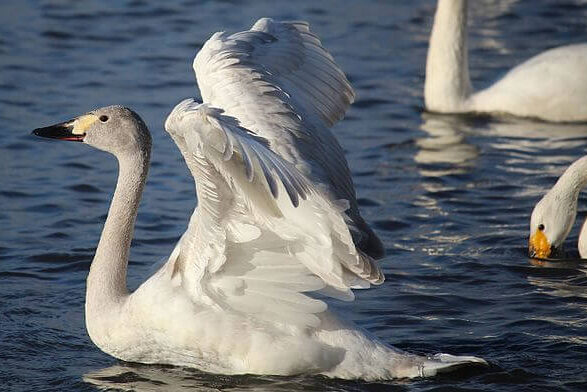
Climate change is altering the migratory behaviour of Bewick’s swans, leading to a decline in their numbers and delayed arrivals in the UK, according to scientists.
The long-running study, initiated in 1965, monitors the return of these swans from their Arctic breeding grounds to the UK, with recent arrivals numbering little over 100 compared to the annual flock of 700 in the past.
The impact of climate change on the natural world, marked by unseasonably hot weather, raises concerns about the long-term return of Bewick’s swans to Britain.
Kane Brides from the Wildfowl and Wetlands Trust highlighted the potential that these swans may never return to the UK, emphasising the need for conservation efforts.
“This is happening right in front of our eyes,” he said. “Climate change is playing its part here.”
Bewick’s swans, characterised by distinctive black markings on their yellow bills, have been tracked using GPS technology, revealing changes in their behaviour.
Hans Linssen of the Netherlands Institute of Ecology said, “Winters used to be colder, so when they came down from Russia they travelled all the way to Britain to be at a comfortable temperature.”
“But these days, winters are warmer, so when they come down, they arrive in Germany and the Netherlands and they think, ‘It’s good here. I’ll stay. I’ll not bother to travel all the way to England.’
“And northern Germany now seems to be the main area for them to stop and spend the winter.”
The global population of Bewick’s swans is dwindling, facing threats such as deliberate killing, lead poisoning, and the loss of wetland habitat.
The arrival of a bonded pair, Maisie and Maifield, at Slimbridge in Gloucestershire marks the latest addition to the study, which has recorded more than 10,000 swans over 60 years.
The study serves as one of the world’s longest-running investigations of a single species, initiated by Sir Peter Scott, and its findings underscore the broader challenges posed by climate change on migratory patterns and the conservation of iconic wildlife.
——————————————————————————
At Natural World Fund, we are passionate about stopping the decline in our wildlife.
The decline in our wildlife is shocking and frightening. Without much more support, many of the animals we know and love will continue in their decline towards extinction.
When you help to restore a patch of degraded land through rewilding to forests, meadows, or wetlands, you have a massive impact on the biodiversity at a local level. You give animals a home and food that they otherwise would not have had, and it has a positive snowball effect on the food chain.
We are convinced that this is much better for the UK than growing lots of fast-growing coniferous trees, solely to remove carbon, that don’t actually help our animals to thrive.
This is why we stand for restoring nature in the UK through responsible rewilding. For us, it is the right thing to do. Let’s do what’s right for nature!
Donate today at https://naturalworldfund.com/ and join in the solution!

